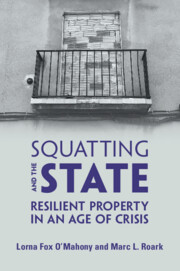Book contents
- Squatting and the State
- Squatting and the State
- Copyright page
- Dedication
- Contents
- Preface and Acknowledgments
- Introduction Squatting, Scale, and the State
- Part I Squatting and the State
- 1 States, Narratives, and Norms
- 2 Squatting and the Law
- 3 Property Theory and the State
- 4 Scaling the State
- Part II Resilient Property in an Age of Crises
- Part III Resilient Property in Action
- Bibliography
- Index
1 - States, Narratives, and Norms
from Part I - Squatting and the State
Published online by Cambridge University Press: 11 August 2022
- Squatting and the State
- Squatting and the State
- Copyright page
- Dedication
- Contents
- Preface and Acknowledgments
- Introduction Squatting, Scale, and the State
- Part I Squatting and the State
- 1 States, Narratives, and Norms
- 2 Squatting and the Law
- 3 Property Theory and the State
- 4 Scaling the State
- Part II Resilient Property in an Age of Crises
- Part III Resilient Property in Action
- Bibliography
- Index
Summary
Homeless squatting on empty land is a local challenge, replicated on a world-wide scale. While some have argued that neoliberal globalization has had a homogenizing effect on domestic legal systems generally, and on states’ responses to squatting more specifically, domestic institutions retain significant capacity and capability to govern; and their resilience critically determines economic success and political stability and nation-states adapt to changing circumstances. This chapter frames our analyses of state responses to homeless squatting on empty land in the context of nation state norms and narratives: what we describe – adapting Robert Cover – as the property “nomos” of each jurisdiction. We argue that state responses to squatting are framed by the “foundational” regime goals through which the state’s role and relationships to citizens with respect to property were articulated and understood, and examine how these foundational goals with respect to private property, housing and citizenship emerged in each of the five primary jurisdictions from which we draw insights and illustrations in this book: the United States of America, Ireland, Spain, South Africa, and England and Wales. In doing so, we aim to better understand how domestic institutions, norms and narratives in each of these jurisdictions have shaped the nomos within which “the state” acts in response to homeless squatting on empty land.
Keywords
- Type
- Chapter
- Information
- Squatting and the StateResilient Property in an Age of Crisis, pp. 23 - 89Publisher: Cambridge University PressPrint publication year: 2022

